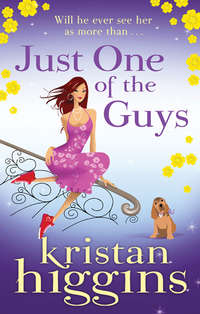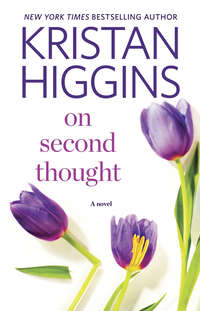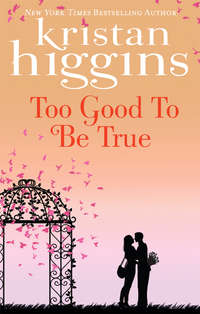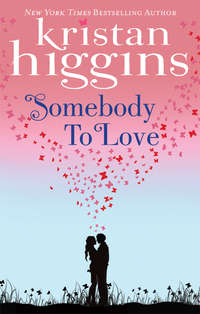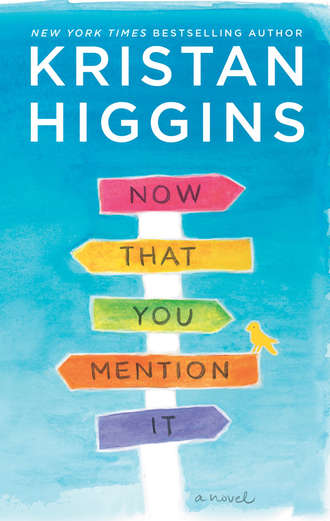
Полная версия
Now That You Mention It
Dad’s smile would drop like granite. “You think I’d let something happen to my girls? You think I don’t love them? Girls, do you think Daddy loves you?”
Of course, we’d say yes. Mom’s mouth would tighten, her eyes would grow hard, and she’d either order us to get in the car or, worse, get in the car by herself and drive away, the rest of our day tainted.
“You’re so brave, my girls,” Dad would say. “Why be alive if you can’t have adventures, right? Who wants to end up all clenched and angry all the time?”
To prove his point, we’d go for one more swim, one more jump, one more thrilling ride down Eastman Hill. Stay out an extra half hour, have ice cream for dinner.
Lily was especially good at embracing Dad’s philosophy. Once Mommy’s girl, she started to avoid her, ignore her or, worse, talk about why Daddy was so much fun in front of her.
My flowers and sea glass didn’t cut it. “Thanks, Nora,” she’d say. But I couldn’t undo the hurt—I wasn’t Lily, after all, the magical, beautiful daughter.
Nothing I did seemed to make much impact on my mother, not the As on my report card, not the Mother’s Day art project—a little pinch pot painted yellow with blue polka dots. (Lily said she forgot hers at school; it never came home.)
I learned to kiss my mother hello when she got home, tell her about my day so I could check the mental box that said Talk to Mom. Every once in a while, Mom would give me a look that said I wasn’t fooling anyone. She wasn’t a little black rain cloud, our mother, but her skies were unrelentingly gray.
But Daddy laughed a ton, and he and Lily and I had so many fun times, so many goofy games and adventurings and imaginative meals, long stories at bedtime or in the car when we’d take a ride to nowhere. Of course, I loved him best.
The guilt hardly ever panged at me. Lily, she was the one who was really mean to Mom. Not me. At least I tried.
One spring day when I was eleven, Lily and I came off the bus to find my mother sitting at the kitchen table, unexpectedly home from work, drinking her coffee. Lily buzzed right past, running up the stairs to throw her backpack on the floor and flop on the bed, as was her custom.
“Hi, Mom!” I said in my fake-cheery voice. “Guess what? Brenda Kowalski threw up during our math test, and it almost got on my desk! She had to go home early.”
“Well, that’s too bad.” She didn’t look up, just sat there, staring ahead, holding her mug. She’d changed from her work uniform of black pants and a white shirt and was wearing jeans and a flannel shirt.
No other words were spoken. Mom just sat there, twisting her wedding ring.
“Where’s Dad?” I blurted, unable to take the silence anymore.
Her eyes flicked to me, then back to the middle distance. “He’s gone,” she said.
“Where?”
“I don’t know. Off island.”
Without us? That was strange. Usually, he’d wait for us, take us on the ferry to Portland, where there was a bakery filled with the most beautiful pastries, and let us get whatever we wanted.
“When will he be back?” I asked.
“I’m not sure.”
My heart started to whump in my chest. “What do you mean, you’re not sure?”
“I don’t know, Nora. He didn’t see fit to tell me.”
Something was wrong. Something big. In that second, I felt my childhood teeter.
I pounded up the stairs. Our room had a slanted ceiling and was divided exactly in half; mine neat and tidy, as Mom requested, Lily’s a snarled mess. She was lying on her unmade bed with her headphones on, waiting for Mom to leave, for Dad to appear with the afternoon’s entertainment, because there was always something fun. Every single day.
I went into our parents’ room, and my breath started to shake out of me.
The closet was open, the top two drawers of the bureau—his—open, as well.
Open and empty. Our father’s shoes—he had more pairs than Mom—were gone. His socks were gone. Empty hangers hung like bones in the closet.
On top of the bureau, dead center, was his wedding ring.
I ran into the bathroom and threw up, my stomach heaving, my whole body racked with the violent expulsion of my ham-and-tomato sandwich and two oatmeal cookies, bits of apple floating on the surface.
“What’s wrong with you?” Lily asked. At ten, she already had a bit of a sneer.
“Daddy’s gone,” I said, my eyes streaming. I puked again, my sinuses burning with throw-up.
“What do you mean, gone? What are you talking about?”
“I don’t know. His clothes are gone. He packed.”
As I sat there, retching into the toilet, my sister ran into our parents’ bedroom, then pounded downstairs. She screamed accusations at our mother, whose flat, implacable voice answered questions. Something ceramic broke—Mom’s cup, I bet, throwing up again at the thought of the smell of coffee.
“I hate you!” Lily screamed. “I hate you!”
Then the door slammed, and it was quiet again.
I waited for my mother to come upstairs and take care of me. She didn’t.
Later that night, Lily told me what happened. Her version of it, anyway. Our mother, who was so boring and hateful and mean, had driven our father away. He’d gotten sick and tired of putting up with her, taken his novel and moved to New York City, where he was born, after all, and he was probably about to become a famous author. He’d call us and tell us to pack our things, that New York was the biggest place of all for adventuring, and we’d move, and Mom could stay here on her stupid Scupper Island.
If that was true...if our dad couldn’t stand our mother anymore, I honestly couldn’t blame him. He was a scarlet tanager, a rare, beautiful bird I’d only seen once in my life, flashing with red, its song happy and bright. She was a mourning dove, gray and dull, endlessly sighing the same notes over and over.
But I didn’t want them to get a divorce.
In my version of what had happened, which I dared not tell Lily, Dad would come home with a bouquet of roses. Mom would be wearing that white dress with the red flowers on it, the only dress she had, and they’d be hugging, and we’d move to New York but come home to Scupper for summers, like the rich people.
Days passed. A week. Lily refused to go to school, and I was put in charge of breakfast while Mom went to work. At night, I listened to the suddenly scary noises of our old house, the muffled sobs from Lily’s side of the room. I tried to climb into her bed to comfort her, but she shoved me away.
I waited for my father to call. He didn’t.
He hadn’t left a phone number, either. He had a brother in Pennsylvania—Jeff, eight years older than my father, a man we’d only met twice before. I called him one afternoon when my mom was at a meeting at school—Lily was acting up. There was a long silence after I asked if he knew where my father might be.
“I’m sorry, sweetheart,” he said. “I don’t. But if I hear from him, I’ll let you know.”
I could tell by his voice he didn’t think this would happen.
Another week crept by. Mom came home on Saturday morning and told us she’d switched her hours so she’d be able to be home with us after school.
“No one wants you here,” Lily said, her voice so cold and cruel I flinched.
“No one asked you,” Mom said mildly.
And that was the end of our deep family discussion.
What if Mom had killed Dad? Was that possible? She could lop the head off a sea bass, slide the knife down its belly and gut the thing in seconds... She could use a gun... We lived on an island, so she could dump his body anywhere and let the tides do what they would. I regretted reading the Patricia Cornwell novels I’d been sneaking out of the library, not to mention Stephen King, the patron saint of Maine. Was my father down the well, like Dolores Claiborne’s husband?
We didn’t have a well. Mom didn’t talk to the police.
He had packed. Left his wedding ring. Sure, Mom could’ve faked it, but she didn’t. I knew.
He was simply...gone. But Lily and I were the lights of his life. He told us that all the time. He wouldn’t just leave us. He would obviously come back for us.
He didn’t. He didn’t come back, he didn’t write, he didn’t call.
The weeks turned into months. I tried to console Lily, asked if she wanted to do things together, but she ignored me, alone in her grief, which she clearly viewed as deeper than mine. I’d lost my father and his buoyant, exhilarating love, and it seemed I’d also lost Lily’s.
I’d lay awake at night, heart pounding, tears slipping into my hair, missing them both with an ache in my heart that blotted out everything else. My childhood had ended, and I never even had the chance to say goodbye.
4
Jake helped me off the ferry. It was a three-hour ride, and I felt a little seasick. Or a little nauseous from my throbbing knee.
Or maybe it was just being back home.
Without a word, he got my bags and led Boomer off the boat, leaving me to crutch it alone, hobbling awkwardly up the gangplank, then onto the old dock.
Though it was mid-April, spring had not yet come to the island. My mom wasn’t here yet, and the downtown was quiet. A raw wind blew the smell of fish and salt and donuts from Lala’s Bakery, and with it, childhood memories. On cold winter Sundays, my father used to wake Lily and me at 5:00 a.m. to get the first donuts Lala made, almost too hot to hold, the sugar crusting our faces, the heat steaming in the wintry air.
I would see her soon, my sister. I would set things right again. That was the chance Beantown Bug Killers had given me, and I would make good on it.
And I would find out what happened with my parents. Where my father was. If he was still alive, I was going to find him, damn it.
When I was in my first year of residency, I’d stitched up a former Boston cop who did private investigations. I hired him to find my father, but he’d come up empty. With such a common name—William Stuart—and nothing else to go on since the day he left, the cop didn’t turn up anything. It was time to try again, and this time, start from square one.
But for now, I had to get down the dock. One thing at a time.
With the sling, the brace and the crutch, I had to think about every step, and the rough, splintered wood of the dock didn’t help. Step, shuffle, crutch. Step, shuffle, crutch. It was slow going.
Jake was already tying Boomer’s leash to the bike rack; I was only halfway there. He walked back to his boat. “Thank you so much, Mr. Ferriman,” I said as he passed. He grunted but didn’t look at me, the charmer.
Slightly out of breath, I got to the end of the dock and patted my dog’s head. A seagull landed on a wooden post, and Boomer woofed softly. Otherwise, the island was quiet, and ominously so, like one of Stephen King’s towns. I missed the cheerful duck boats of Boston Common, the elegant shops of Newbury Street. Here, nothing was open.
Scupper Island Clam Shack, where I had worked for two summers, sat at the end of Main Street, right on the water. It wouldn’t open until Memorial Day, if it was the same as it used to be.
I’d worked there with Sullivan Fletcher, one of the two Fletcher boys in my class. Sully had been in a car accident our senior year shortly before I left Scupper, and I wondered how he was. I’d wondered often over the years. Word had been that he’d recover, but I’d never asked for details (nor was my mother the detail type).
I looked to my right, and there was my mother’s elderly Subaru turning onto Main Street. I waved, not that she could miss me; I was the only one here. She pulled over, turned off the engine and got out, looking the same as ever, and unexpected tears clogged my throat. “Hi, Mom,” I said, starting to move forward for a hug.
She nodded instead, then hefted my two suitcases into the back of the car. “I didn’t know you were bringing your dog,” she said. Boomer wagged his fluffy tail, oblivious. “He better leave Tweety alone.”
Tweety was Mom’s parakeet (and favorite creature in the world). “Tweety’s still alive, then?”
“Of course, he is. Where’s that dog gonna sleep?”
“It’s good to see you, too, Mom,” I said. “I’m fine, thanks. In a lot of pain, actually, but doing okay. After being run down in the street. By a van. Sustaining many injuries, in case you forgot.”
“I didn’t forget, Nora,” she said. “Get in the cah.”
Boomer jumped in at the magical words, filling the entire back seat.
A thickly built woman with hard yellow hair approached our car. “Hey, Sharon. Who you got there?” Who y’gawt they-ah? Good to see the Maine accent was alive and well. The speaker was Mrs. Hurley, mother of Carmella Hurley, one of the mean girls from high school. I’d called them the Cheetos back then (not aloud, of course)—the popular, mean girls who’d go to Portland to woo cancer at tanning salons, resulting in a skin tone not found in nature.
“It’s my daughter,” Mom said.
“Lily, you’re back, sweethaht?”
“Uh, no. I’m Nora. Hi, Mrs. Hurley. Nice to see you. How’s Carmella?”
Her face hardened. Right. I was not an islander who had brought pride to my hometown. I was the girl who stole the prince’s crown. Also, I looked a lot different from the olden days, when I’d been a fat, lumpy teenager with bad hair and worse skin.
“Cahmeller’s wonderful,” Mrs. Hurley bit out. “Well. You have a good day, Sharon. Nora.”
It would soon be all over town that I was back.
Mom got into the driver’s seat, and I flopped gracelessly in mine, ass first, bumping myself in the face with the crutch.
“So how is Carmella?” I asked, fastening my seatbelt.
“Good. Five kids. Cleans hotel rooms in the summer, bartends at Red’s. Hard worker.” Hahd wehrkah. Man, I guessed my accent had faded more than I realized. That, and I hadn’t talked very much to my mom these past few years. Perfunctory phone calls, her annual twelve-hour visit to Boston.
“You’ll be sharin’ your room with Poe,” she added.
“I will?”
“Well, where do you think she’s sleepin’?” Mom pulled away from the curb.
Good point. I suppressed a sigh and looked out the window. Main Street had gentrified a bit. There was a bookstore I’d never seen, called The Cracked Spine. Cute name. Lala’s Bakery, which would have a line around the corner every day in the summer, was fairly deserted now. A kitchen goods store. Huh.
“How is Poe?” I asked. I hadn’t seen my niece for five years.
My mother shrugged.
“Mom, could you actually tell me?” I snapped. Five minutes, and already I was irritated.
“She’s grumpy. Hates it here.” She turned onto Perez Avenue, renamed for the man who’d sent a Scupper Island kid to college every year for the past quarter century...including me. We passed the ubiquitous made-in-China souvenir shop, unimaginatively called Scupper Island Gift Shoppe (I always hated the spelling), a restaurant I’d never seen, an art gallery, another restaurant.
We’d never be Martha’s Vineyard—too far, too cold, too small—but it seemed my hometown had blossomed.
“Did things go okay in Seattle?” I asked, referencing my mom’s recent visit to fetch Poe.
“Dirty town,” Mom said. “Lots of litter. And beggars.”
Of course. Look on the dark side, that was my mother’s motto. She didn’t approve of panhandling, having grown up poor herself. But her version of poor was scrappy. It meant hunting and fishing for your food if you had to, knowing how to put up the vegetables from your garden, dry fish, smoke meat. If you didn’t have something, you made do.
I’d been to Seattle four times to see my sister. I would’ve gone more, but Lily was always slippery about letting me come out there to see my niece. Once, Roseline came with me, which was a good thing, because Lily became “too busy” to see me, and I only got to see Poe for an hour. I’d been crushed, having pictured the four of us going out for pastries, visiting the public market on Pike Street, eating at the top of the Space Needle. Rosie stepped up, and we did have fun—we ate crab and salmon till we just about turned pink, kayaked in Puget Sound, almost peeing ourselves when a pod of orca whales came within a hundred yards of us, giggling hysterically with fear and awe.
But in the back of my mind had been the thought, If only Lily was here. Now this is adventuring! If only it was like old times. The fact was, those old times had been old for more than a decade at that point.
“And how is Lily?” I asked, when it became apparent my mother wasn’t going to mention her.
My mother’s gaze didn’t stray from straight ahead. “She’s in jail, Nora. How do you think?”
I took a slow breath before speaking again. I knew she was in jail. My mom didn’t have to be an ass about it. “Is she doing okay? Did you see her?”
“Ayuh. She seems fine.”
Fine. Really? Was she devastated? Heartbroken? Remorseful? Angry? She was probably angry. She had been for the past twenty-four years, at least as far as I could tell. Since the day our father left.
Within three months of landing in Seattle at the age of eighteen, Lily had gotten tattooed, pierced and pregnant. She had a series of boyfriends; I had never met Poe’s father, and to the best of my knowledge, neither had Poe. Lily’s job history was spotty—barista (of course, it was Seattle), band manager for a local group, temp, barista again, tattoo artist.
My sister was also a petty criminal. Identity theft, credit card fraud and drug dealing, though the legalization of marijuana had put a dent in her business. I hadn’t known about any of that until last month, when my mother told me she had to fly out and get Poe, because my sister had been sentenced to two years, out in August with good behavior.
Beantown Bug Killers had given me a plan. Stay on Scupper until Lily got out. Then she’d either come east to fetch her daughter, or I’d fly back with Poe. And I’d...fix things.
How, I wasn’t sure.
We turned onto the dirt road that led to our house, and I held my arm across my chest to minimize the jostling. My collarbone ached. Mom glanced at me but said nothing. In the back seat, Boomer whined with excitement, sensing we were close to our destination. The car jolted over a pothole, and I sucked in a breath, my knee and shoulder flashing white with pain. My back ached, too, heavy and dull thanks to the bruised kidneys. Hopefully, I wouldn’t be peeing blood later on.
And there it was. Home. A humble, gray-shingled Cape with a screened-in deck on one side, almost exactly as I’d left it, the bushes in front taller than I remembered.
I’d been away for so long.
My mom pulled into the unpaved driveway—we didn’t have a garage—and threw the car into Park. She got out, opened the back door for Boomer, who raced off to sniff and mark his territory.
Lily and I used to think home was the most magical place on earth—the sound of chickadees and crows, gulls, the frigid ocean slapping against the rocks a few hundred yards away, the gray seals that would visit the shores with their pups. The wind would scrape and roar across the sky almost constantly, howling in the winter. The yard was just a carpet of pine needles, and beyond that, forest and ocean. The Krazinskis were our next-door neighbors, and they were half a mile away. Lily and I, and sometimes Dad, used to sit for hours in trees or makeshift forts and wait to see animals—fox and deer, pheasants and chipmunks, porcupines and raccoons.
I opened the car door, the smell of pine and wood smoke thick and rich.
Though I wouldn’t go so far as saying it was good to be home—not yet—I knew this was where I needed to be.
I tried to get out of the car, but since my knee was in a brace and I couldn’t bend it, I flopped right back onto the seat, jarring my collarbone, pain flashing all the way into my fingertips.
Being helpless sucked.
Also, my mother wasn’t the world’s most loving caretaker. She was halfway to the house with my suitcases. “Mom? Can you give me a hand?”
“Poe!” she yelled. “Get out here and help your aunt!” She went inside.
The wind gusted, cutting through my jacket, pressing me back into the seat as I struggled. The Dog of Dogs came up to check on me, and I patted his head with my good hand. Dogs beat people every time. “Are you my pretty boy?” I asked. He wagged in the affirmative, then trotted off again.
Finally, the door opened, and out came my sister.
No. It was Poe, but the resemblance was shocking.
My niece was beautiful. Her hair was dyed blue, shaved on one side, jagged on the other. She wore torn leggings and a T-shirt with a skull on it. As she got closer, I could see she was bedecked with black rubber bracelets and more ear piercings than I could count and had a tattoo on her neck.
She looked far, far older than fifteen. But her skin was pure and sweet, and her eyes were the same shade as blueberries, just like Lily’s.
“Hi, honey,” I said. “You got so big.” My voice was husky. The last time I’d seen her, five years ago, she asked me for piggyback rides, which I happily gave. She’d had long black hair back then, and I taught her to French-braid it.
She gave me a dead-eyed stare, looking more like Lily than ever.
“Uh, can you just...” I held out my hand. “Take my crutch, okay.”
She did, and I hoisted myself out, then hopped, grabbed onto her with my good hand and steadied myself. Took the crutch back. “Thanks, Poe.”
“What happened to you?”
I blinked. “Gran didn’t tell you?” Wasn’t it important enough for a mention? “I was hit by a van.”
“Seriously?”
“Yep. I broke my collarbone, got a concussion and dislocated my kneecap. And bruised my kidneys.”
“Gross.”
“Yeah.”
“Can you sue them or something?” she asked with a flicker of interest. “Like, if it was FedEx or the cops?”
“It was Beantown Bug Killers, and no. I was jaywalking.”
The interest faded, and the disgust returned.
We went inside, though she was faster than I was, obviously, and failed to hold the door for me. “Come on, Boomer,” I said, and he trotted in, nearly knocking me over, unaware that he no longer weighed twelve pounds. I followed awkwardly. Poe was already slumped on the couch, engrossed in her phone. Mom was in the kitchen, her yellow parakeet on her shoulder.
The interior of the house was the same. I looked into the little den, almost expecting to see my father there, clacking away on his computer, or Lily, playing with her Barbies on the floor in the living room. The woodstove sat on the hearth of the stone fireplace, a more efficient way to heat the house. Same brown plaid couch, same old recliner, same coffee table where Lily and I had colored and chattered.
Of course, it was the same. My mom wasn’t the type to throw things away, and she could fix anything.
I thought of my apartment—not Bobby’s, but mine, the one I’d had before the Big Bad Event. The pale green couch, the balcony, the pretty throw pillows on the bed. All those lovely things, packed away in a storage unit in Brookline.
“Get away from me, dog,” Poe said. “Is he really going to live with us?”
“This is Boomer. He loves people.” He whined, echoing my message, and licked Poe’s hand. She turned away without looking up from her phone.
I crutched it into the kitchen. Same creaky table where I’d done so much homework.
Mom was pouring herself a cup of sludge. “Want a cup?” she asked. The bird was sitting on a shelf. Near food.
“Does that bird ever go in its cage?”
“Sometimes. At night. Mostly, he flies around where he wants. Coffee?”
“Sure.”
When I was in medical school, my mother came on one of her annual Visits to Boston because I Have to See My Daughter and informed me she’d gotten a bird. Tweety, not the most original name. She taught it (him? her?) tricks, such as eating a cracker held between her lips or sitting on her head while Mom drank coffee. Tweety could give kisses, which made me shudder and envision my mother dying an agonizing death from bird-borne encephalitis. When I called twice a month, I could often hear Tweety in the background, sounding much like a knife scraping against a plate.






